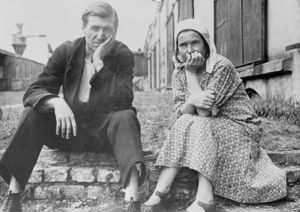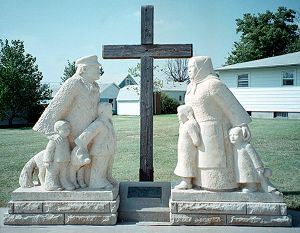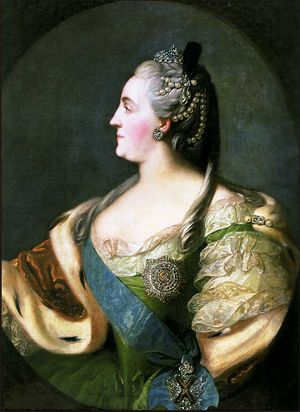ألمان الڤولگا
Wolgadeutsche | |
|---|---|
| المناطق ذات التجمعات المعتبرة | |
| 394,138[1] |
| 200,000[2] | |
| اللغات | |
| Russian, German | |
| الدين | |
| Lutheran, Roman Catholicism, Baptist, Mennonite | |

ألمان الڤولگا (ألمانية: Wolgadeutsche أو Russlanddeutsche؛ روسية: Поволжские немцы؛ Povolzhskiye nemtsy؛ إنگليزية: Volga Germans) هم من العرق الألماني الذين استوطنوا وعاشوا تاريخياً بحذى نهر الڤولگا في منطقة جنوب شرق روسيا الأوروبية حول ساراتوڤ وإلى الجنوب. Recruited as immigrants to Russia in the 18th century, they were allowed to maintain their German culture, language, traditions, and churches (Lutheran, Reformed, Catholics, Moravians, and Mennonites). In the 19th and early 20th centuries, many Volga Germans emigrated to Kansas, the Dakotas, California and other states across the western United States, as well as to Canada and South America (mainly Argentina and Brazil).
After the German invasion of the Soviet Union in 1941 during World War II, the Soviet government considered the Volga Germans potential collaborators, and transported many of them eastwards, where thousands died. After the war, the Soviet Union expelled some ethnic Germans to the West. In the late 1980s and 1990s, many of the remaining ethnic Germans moved from the Soviet Union to Germany.
كاترين العظمى
In 1762, Catherine II, born a German princess and a native of Stettin, Pomerania, deposed her husband Peter III, born a German prince in Kiel, and took the Russian imperial throne. Catherine the Great published manifestos in 1762 and 1763 inviting Europeans (except Jews)[3] to immigrate and become Russian citizens and farm Russian lands while maintaining their language and culture. Although the first received little response, the second improved the benefits offered and was more successful in attracting colonists. People in other countries such as France and England were more inclined to migrate to the colonies in the Americas than to the Russian frontier. Other countries, such as Austria, forbade emigration. The settlers came mainly from Bavaria, Baden, Hesse, the Palatinate, and the Rhineland, over the years 1763 to 1767.
The early German settlements were attacked during the Pugachev uprising, which was centred on the Volga area, but they survived the rebellion. According to Darrel P. Kaiser, "Kazakh-Kirghiz tribesmen kidnapped 1573 settlers from colonies in 1774 alone and only half were successfully ransomed. The rest were killed or enslaved."[4]
انظر أيضاً

- ألمان قزخستان
- تاريخ الألمان في روسيا والاتحاد السوڤيتي
- Volga German Autonomous Soviet Socialist Republic
- ڤولهينيا
- Russian Mennonites
- ألمان البلطيق
الهامش
- ^ Russian Census 2010: Population by ethnicity (بالروسية)
- ^ Stat.kz
- ^ Lewis, Bernard, Semites and Anti-Semites, New York, W. W. Norton & Company, 1999 edition, ISBN 0-393-31839-7, p. 61.
- ^ Darrel P. Kaiser (2006). Origin & Ancestors Families Karle & Kaiser Of the German-Russian Volga Colonies. Darrel P. Kaiser. ISBN 978-1-4116-9894-9. Retrieved May 31, 2012.
وصلات خارجية
- The Center for Volga German Studies at Concordia University
- Germans from Russia Heritage Society
- Flag
- Volga Germans
- American Historical Society of Germans from Russia
- Germans from Russia Heritage Collection North Dakota State University
- Germans from Russia in Argentina Genealogy (بالإسپانية)
- Wolgadeutschen (بالروسية)
- The Golden Jubilee of German-Russian Settlements of Ellis and Rush Counties, Kansas
- Germans from Russia in Argentina
- German Memories - Volga Germans Migration Towards Americas
- Articles using infobox ethnic group with image parameters
- Articles containing ألمانية-language text
- Pages using Lang-xx templates
- Articles containing روسية-language text
- Articles containing إنگليزية-language text
- ألمان الڤولگا
- Russian and Soviet-German people
- الشتات الألماني في أوروپا
- العلاقات الألمانية السوڤيتية
- العلاقات الألمانية الروسية
- جماعات عرقية في روسيا
- جماعات عرقية في قزخستان
- أقليات ألمانية
